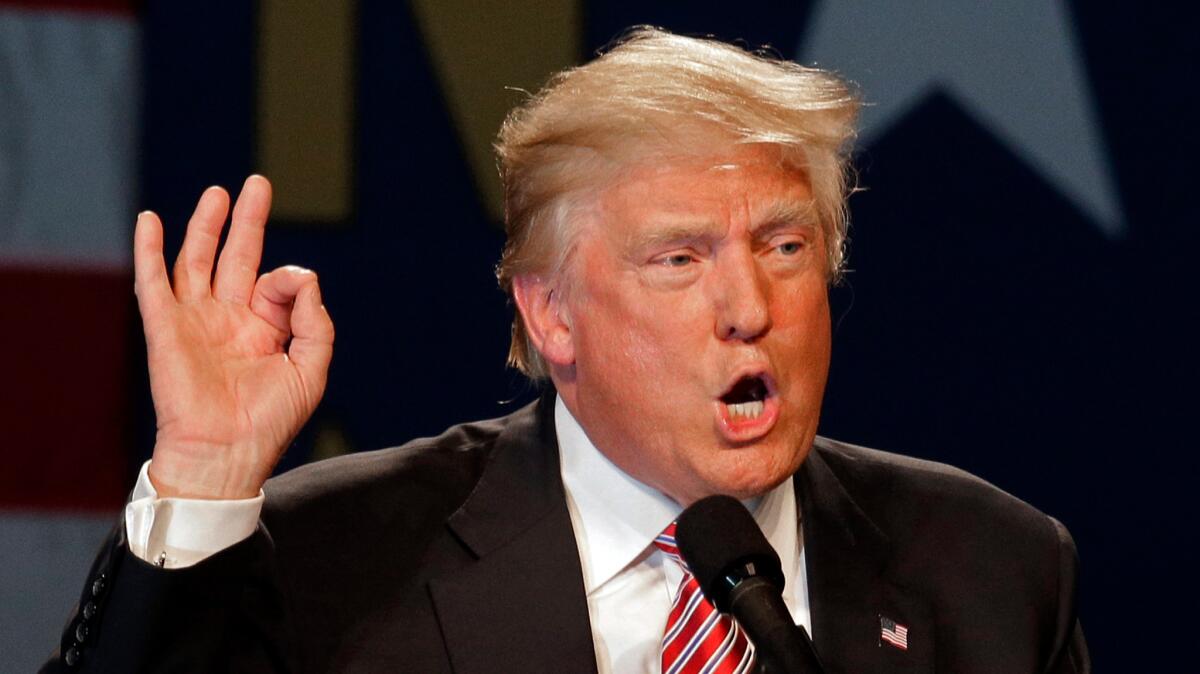Q&A: Has Trump violated the 1st Amendment? Not yet

The 1st Amendment is no stranger to debate. Centuries after its ratification, it is again under scrutiny as events pertaining to the 2016 election, and more specifically, Donald Trump’s campaign, have raised questions about its power and limitations – especially when it comes to the freedoms of speech and press.
Trump in June added the Washington Post to his list of organizations banned from accessing media credentials to his rallies. Individual reporters for other outlets have been denied credentials or ushered out. He’s removed silent protesters from rallies. But none of these acts are in violation of the 1st Amendment because the 1st Amendment applies only to government action.
“There’s a huge gulf between Trump the president and Trump the candidate,” said USC law professor Michael Shapiro.
As tens of thousands of journalists prepare to descend on Cleveland, where Trump will headline the Republican National Convention and claim his party’s nomination, we took a look at how his actions relate to the 1st Amendment.
Election 2016 | Live coverage on Trail Guide | Sign up for the newsletter
Trump says he’ll make it easier to sue news organizations.
Trump has said that if elected president, he will make it easier to sue news organizations by changing libel laws.
"I'm going to open up our libel laws so when they write purposely negative and horrible and false articles, we can sue them and win lots of money," he told supporters at a rally in February.
According to an American Civil Liberties Union report released Thursday morning, claims for libel fall under state law, not federal.
“Were he to become president,” the report reads, “Trump could not ‘open up our libel laws’ because there is no federal libel law for the president to ‘open up.’”
There’s a huge gulf between Trump the president and Trump the candidate.
— USC law professor Michael Shapiro
Current law, under the 1964 case of New York Times Co. vs. Sullivan, says a public figure can only win a libel suit against a media organization if it is proved that incorrect information was knowingly published.
"I’m not sure that Trump understands the basic structure of the American government,” Shapiro said. “The president can’t just do all of this stuff on his own."
In order for these laws to be eliminated, the Supreme Court would have to overturn them.
In May, Trump threatened to sue the New York Times over an article on his treatment of women. Trump's lawyer has since retracted that statement.
Trump has banned seven news organizations from gaining media access to his events.
The Washington Post was the most prominent addition to the so-called blacklist — the list of news organizations Trump has banned. The candidate’s reasoning? “Inaccurate” coverage.
The Post’s counter-argument said the decision “is nothing less than a repudiation of the role of a free and independent press.”
But it’s technically not out of constitutional bounds.
“Candidates are not subject to the 1st Amendment even though their candidacies are part of the fabric of government. Otherwise, the scope of private action would be unduly constricted,” Shapiro said.
What if if Trump upheld a media ban as president?
“That to me would be a flat violation,” Shapiro said
If elected, Trump would presumably continue to have private meetings, just as presidents have throughout history. But if he routinely privatized what previously were public events, Shapiro said, “it would threaten our democratic foundations by providing an avenue for closed, authoritarian governance.”
Trump regularly removes protesters from rallies.
Following a surge in protests and violent incidents, the Trump campaign started playing the following announcement at rallies in December:
“If a protester starts demonstrating in the area around you, please do not touch or harm the protester. This is a peaceful rally. In order to notify the law enforcement officers of the location of the protester, please hold a rally sign over your head and start chanting: ‘Trump! Trump! Trump!’ Ask the people around you to do likewise until the officer removes the protester. Thank you for helping us make America great again.”
Trump isn’t violating a protester’s freedom of speech by removing the person from his events. Though his rallies are often held in public areas, they can still be deemed private functions.
“From Trump’s standpoint, it's his party and he doesn't have to invite everyone," Shapiro said.
What about the future? Could Trump’s actions now be held against him if he were to become president?
“No. Becoming president isn't going to retroactively turn his ‘private’ candidacy actions into government action," Shapiro said.
Trump has called for a ban on Muslims entering the U.S.
The ACLU says Trump’s call to ban Muslims’ entry into the country would violate the 1st Amendment’s establishment clause “by explicitly disapproving of one religion and implicitly preferring others.” The ACLU says U.S. citizens could challenge a ban and argue that it impedes on the freedoms of religion, speech and association.
Logistically, Trump’s proposal is a matter of immigration. For more on that, read Noah Bierman’s explainer.
Twitter: @cshalby
ALSO
News coverage of campaign greatly aided Trump and hurt Clinton, study finds
Red vs. Blue states: Check out our interactive Electoral College map
Get the L.A. Times Politics newsletter
Deeply reported insights into legislation, politics and policy from Sacramento, Washington and beyond. In your inbox three times per week.
You may occasionally receive promotional content from the Los Angeles Times.




